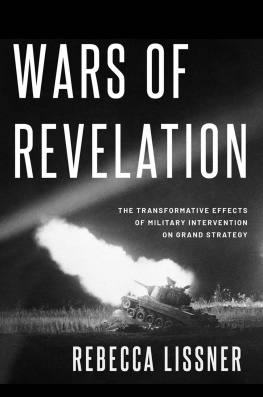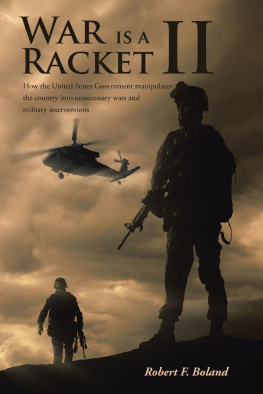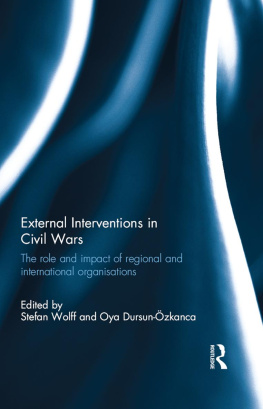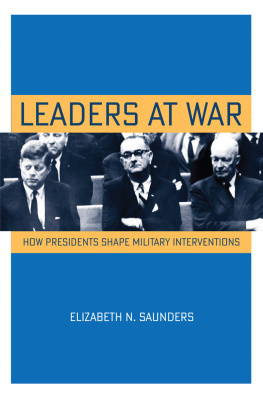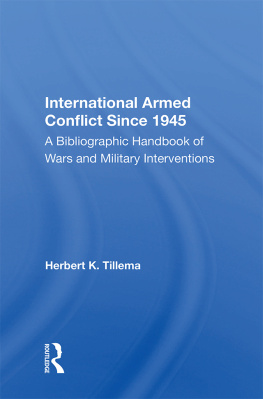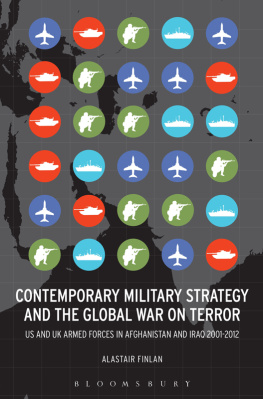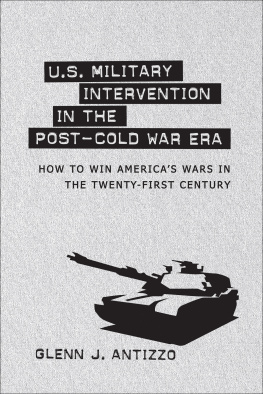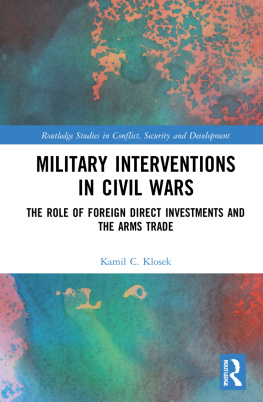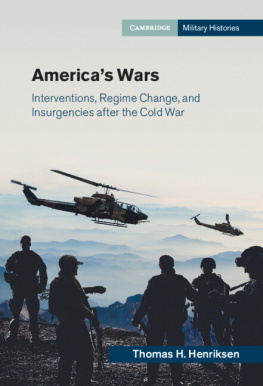Wars of Revelation
Wars of Revelation
The Transformative Effects of Military Intervention on Grand Strategy
REBECCA LISSNER


Oxford University Press is a department of the University of Oxford. It furthers the Universitys objective of excellence in research, scholarship, and education by publishing worldwide. Oxford is a registered trade mark of Oxford University Press in the UK and certain other countries.
Published in the United States of America by Oxford University Press
198 Madison Avenue, New York, NY 10016, United States of America.
Oxford University Press 2021
All rights reserved. No part of this publication may be reproduced, stored in a retrieval system, or transmitted, in any form or by any means, without the prior permission in writing of Oxford University Press, or as expressly permitted by law, by license, or under terms agreed with the appropriate reproduction rights organization. Inquiries concerning reproduction outside the scope of the above should be sent to the Rights Department, Oxford University Press, at the address above.
You must not circulate this work in any other form and you must impose this same condition on any acquirer.
CIP data is on file at the Library of Congress
ISBN 9780197583197 (pbk.)
ISBN 9780197583180 (hbk.)
ISBN 9780197583210 (epub.)
DOI: 10.1093/oso/9780197583180.001.0001
For my parents, Paul and Vicky Friedman, who made everything possible.
Contents
As I began the earliest drafts of this book in 2011 and 2012, the United States was mired in debate about the withdrawal of troops from Iraq, the legacy of that war, and the way forward for American grand strategy. The stakes of the Iraq War were manifestly vast, and I cravedbut could not findscholarship that explained why such a military intervention could upend the United States conception of its role in the world. Nearly a decade later, this book is my attempt to bring a broader theoretical and historical aperture to debates, still ongoing, about the lessons learned from Americas postCold War record of military interventions.
Adjustments to American grand strategy can be difficult to discern as they are happeningand relevant government documents remain strictly classified for at least 25 yearsso I trained my sights on the more distant past: the Cold War. Of course, time did not stop as I completed this book, and today these pages have a resonance I did not anticipate at the projects genesis. Military interventions have continued, with a counter-Islamic State campaign launched in 2014 and Americas longest-ever war in Afghanistan, which stretched until 2021. Grand strategy debates have only become more urgent and intense, particularly in the wake of Donald Trumps disruptive presidency. With Chinas rise to global power and influence, new Cold War narratives are on the ascendancepiquing interest in the United States strategy for long-term competition with the Soviet Union.
From inception to conclusion, this book has benefited from the generosity and insight of many brilliant scholars. At Georgetown, David Edelstein, Dan Byman, and Dan Nexon nurtured this project from our earliest, exploratory conversations about the ideas developed in these pages. David is the consummate academic champion: tough-minded and incisive in his feedback yet unerring in his encouragement. He takes mentorship seriously and listens intently to the aspirations of his students; I am fortunate to have benefitedand to continue to benefit fromhis advice and friendship. Dan Byman modeled dual citizenship of the academic and think tank worlds, inspiring me with his uncompromising rigor, extraordinary productivity, and exceptional kindness. Dan Nexons expansive intellect broadened my understanding of international relations; his influence infuses all of my work, including this book. Ive also benefited greatly from the instruction, friendship, and mentorship of many other members of the Georgetown faculty, especially Charlie Kupchan, Keir Lieber, and John McNeill.
Several others were essential guides on the journey that led to this books publication. In high school, an extraordinarily lucky encounter with Liz Sherwood-Randall illuminated a new world of career possibilities in national security; her example continues to shine brightly. While an undergraduate at Harvard, I was fortunate to study under two luminaries whose ideas I reflect upon frequently: Ernest May and Stanley Hoffmann. The research and teaching of these two men provided the intellectual foundation upon which everything else has been built. Frank Gavin performed a deus ex machinaof the kind only he is ableearly in my graduate studies, challenging me to tackle a big, important question and break free of disciplinary strictures. This book would not exist, or at least not in this form, were it not for his influence and ongoing friendship.
Several other institutions provided stimulating intellectual homes over this projects progression. In the 20152016 academic year, I spent a year at International Security Studies (ISS) at Yale as a Brady-Johnson Predoctoral Fellow. It was a privilege to learn from Paul Kennedy and John Gaddis, who graciously granted me temporary membership into the tribe of diplomatic and military historians. Betsy Bradley and Chris Miller welcomed me into the Brady-Johsnon Program in Grand Strategy, and Amanda Behm, Liz Vastakis, Kathleen Galo, and Igor Biryukov anchored the ISS community. From 2016 to 2017, the Council on Foreign Relations (CFR) hosted me for a rewarding year as a Stanton Nuclear Security Postdoctoral Fellow. Having begun my career at CFR, it was a great privilege to return and I owe a debt of gratitude to Richard Haass, Jim Lindsay, Amy Baker, Janine Hill, and Victoria Harlan.
In the 20172018 academic year, I joined the University of Pennsylvanias Perry World House as a Postdoctoral Fellow. Though still a comparatively young institution, it has already made a substantial impact thanks to the leadership of Bill Burke-White and Mike Horowitz. Working closely with Mike was an incredible privilege, and his support was invaluable as I began turning my dissertation into a book. Perry World House generously hosted a book workshop for me; each participant invested considerable time in making this book betterCharlie Glaser, Elizabeth Saunders, Josh Rovner, Avery Goldstein, Alex Weisiger, Sarah Maxey, and Mike Horowitz.
Since 2019, Ive had the good fortune to serve on the faculty of the U.S. Naval War College. Tom Culora, Colin Jackson, and Drew Winner deserve great credit for making the Strategic and Operational Research Department an extraordinary community of scholars and friends. In addition to these leaders, numerous colleagues have enriched my time in Newport and provided guidance as I finished this book, including Jon Caverley, Emily Holland, Isaac Kardon, Jackie Schneider, Mike OHara, and Lindsay Cohn. Peter Dombrowski was exceptionally generous in reading and commenting on the entire manuscript in its final stage.
Numerous additional friends and colleagues invested time and energy in making my work betterand supporting me along the way: Abigail Arzoumanov, Jon Askonas, Naazneen Barma, Andrew Bennett, Hal Brands, Ryan Brutger, Ryan Evans, Peter Feaver, Mike Gallagher, Jim Goldgeier, Ariya Hagh, Richard Immerman, Bruce Jentleson, Richard Kohn, Walter McDougall, Simon Miles, Nuno Monteiro, Sebastian Rosato, Andrew Ross, Jim Steinberg, David Tingle, Marc Trachtenberg, Stephen Wertheim, Marilyn Young, and Philip Zelikow. This book is sharper for my partnership with Mira Rapp-Hooper, who is a constant source of insight and inspiration. Lena Andrews and Julia Macdonald provided me with sage counsel and good humor when I needed it most. Emily Cunningham lent her keen editorial eye and expertise as I navigated the world of book publishing. At Oxford University Press, I was fortunate to work with David McBride and his team, and to benefit from the insights of two trenchant reviewers.

